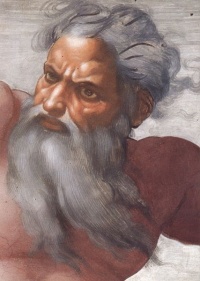God
From The Art and Popular Culture Encyclopedia
(Difference between revisions)
| Revision as of 08:19, 18 May 2013 Jahsonic (Talk | contribs) ← Previous diff |
Revision as of 14:51, 28 May 2013 Jahsonic (Talk | contribs) Next diff → |
||
| Line 5: | Line 5: | ||
| '''God''' most commonly refers to the [[deity]] [[worship]]ped by followers of [[monotheism|monotheistic]] [[religion]]s, whom they believe to be the [[Creation (theology)|creator]] and ruler of the [[universe]]. | '''God''' most commonly refers to the [[deity]] [[worship]]ped by followers of [[monotheism|monotheistic]] [[religion]]s, whom they believe to be the [[Creation (theology)|creator]] and ruler of the [[universe]]. | ||
| - | [[Theology|Theologians]] have ascribed various attributes to God, including [[omniscience]], [[omnipotence]], [[omnipresence]], perfect [[Goodness and evil|goodness]], divine [[simplicity]], and eternal and necessary existence. He has been described as [[Corporeal|incorporeal]], a personal being, the source of all [[moral obligation]], and the "greatest conceivable existent". | + | [[Theology|Theologians]] have ascribed various attributes to God, including [[omniscience]], [[omnipotence]], [[omnipresence]], perfect [[Goodness and evil|goodness]], divine [[simplicity]], and eternal and necessary [[existence]]. He has been described as [[Corporeal|incorporeal]], a personal being, the source of all [[moral obligation]], and the "greatest conceivable existent". |
| == See also== | == See also== | ||
Revision as of 14:51, 28 May 2013
|
Related e |
|
Featured: |
- "I would only believe in a God that knows how to dance" -- Nietzsche in Thus Spoke Zarathustra
God most commonly refers to the deity worshipped by followers of monotheistic religions, whom they believe to be the creator and ruler of the universe.
Theologians have ascribed various attributes to God, including omniscience, omnipotence, omnipresence, perfect goodness, divine simplicity, and eternal and necessary existence. He has been described as incorporeal, a personal being, the source of all moral obligation, and the "greatest conceivable existent".
See also
- Concerning the surface of God, a chapter in Alfred Jarry's Exploits and Opinions of Dr. Faustroll, pataphysician
- To Have Done With the Judgment of god by Antonin Artaud
Citations
See also
- God (male deity)
- God in Buddhism
- God in Christianity
- God in Hinduism
- God in Islam
- God in Judaism
- God the Father in Western art
- God the Father
- List of deities
- Loves of the gods
- Pantheon (gods)
- Religion
- Our Gods Wear Spandex
Unless indicated otherwise, the text in this article is either based on Wikipedia article "God" or another language Wikipedia page thereof used under the terms of the GNU Free Documentation License; or on research by Jahsonic and friends. See Art and Popular Culture's copyright notice.


